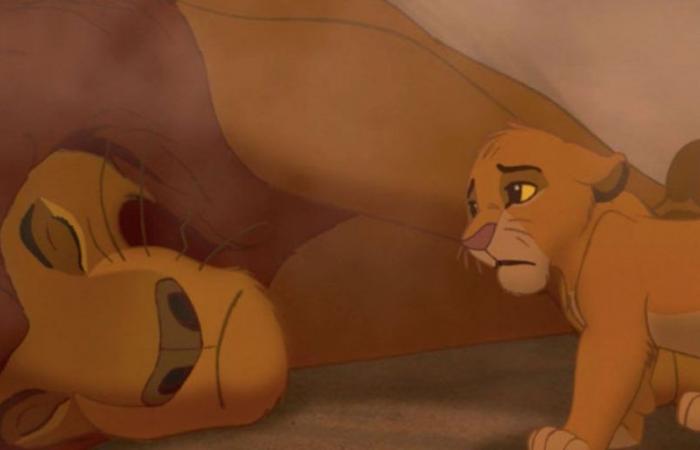There is a huge sun that opens the first sequence of “The Lion King”. It’s the beginning of a new day, it’s the beginning of a new life. That of Simba, a prince revealed to the subjects of a kingdom that, sooner or later, he will govern. It’s the circle of life, says the soundtrack. It is the law of nature and of the strongest, it is understood by adults. Mufasa and Sarabi, King and Queen, are apparently enlightened rulers. “Good”, one could say using narrative terms. The plans of the “bad” Scar are instead to overthrow the monarchy and take a power that will never be his by right. The only way for him to reign is to overthrow the crown. Kill Mufasa.
Here lies the brutal realism of “The Lion King”inspired by Hamlet, but also by the revolutionary choice made by “Bambi” in showing death. Children’s fiction is full of orphans and murdered parents. However, it was rare to see their death, especially if it occurred in front of their children. In the most tragic moment (not the most unexpected) “The Lion King” it has the sequence that changes everything: a before and an after.
A sensation… self-fulfilling
It’s as if the king knew he had little time left. It’s hard to believe that he had guessed the conspiracy. It’s more of a logical (Leo) deduction. The end comes to almost no one due to old age in the savannah. Succession to power in a place where the law of the strongest applies can only come with death. Thus, he speaks to his son exclusively with great lessons. Simba, for his part, is perplexed by his father’s gravitas. He asks him if he will always be with him, even when he is king.
The entire film that takes place after death addresses this observation: there cannot be two kings at the same time. One must die for the other to arise. Simba, alone with the weight of the kingdom, seeks his father’s reflection in him.
Before that tragic sequence, we see that Mufasa’s effort is to make people understand the harsh beauty of the circle of life. Existing and not existing are two equally natural conditions. Only from the end of something can something else be born, stronger, more beautiful. The whole story has a prophetic aspect, of destiny and destinations. Mufasa’s death was written in the stars. Mufasa’s death is the thematic center of the film: accepting the alternation of life and death, living the night.
Even the good (and the strongest) can die in The Lion King
Screenwriter Linda Woolverton recalls writing the death scene: “The goal was to make Mufasa the greatest father who ever lived, and then kill him.” She explains that the writers worked hard to find the right emotional zone for the story. Not too little, but not too much either. After a test screening in which viewers burst into desperate tears, they decided to tone down the scene. Still, this remains heartbreaking, especially for first-time audiences. Woolverton tested the she-on-her-daughter scene for the last time on the day of the premiere, only to be met with a sharp “how dare you (kill Mufasa)?” response. A reaction that belongs to an entire generation of spectators. Maybe even more.
A collective trauma? Yes, because in that crucial moment, when the little one approaches the lifeless body, the difference in size between the two symbolizes the end of protection. The king is dead and with him is also the father who seemed invincible in the eyes of his son. Everyone can end up the same way. “The Lion King” It thus becomes, starting from this moment, a journey towards the acceptance of mourning, but above all it marks the end of childhood and the beginning of a growth process. Simba must learn to shoulder the responsibilities. He is not allowed a “Hakuna Matata” life. In reality, what the young prince will unconsciously follow is a slightly different path. The savannah leads him to retrace his father’s path and finally make him relive his own actions.
Mufasa’s death brings this about “The Lion King” to being a film about youth, about the drive to grow up and about embracing the darkness, the lack, the pain that this process requires. That moment is fundamental to redefine the scale of danger. From that of a child who believes that everything will remain like this forever, to that of an adult who perceives the transience of things.
The weight of power
Faithful to its Shakespearean inspiration, “The Lion King” is one of the most mature Disney films ever. It’s not because it contains a scene of this dramatic magnitude, it’s because of what that moment entails. If Bambi’s mother dies due to the cruelty of the hunters, Mufasa is killed because he holds power and is not willing to give it up. Under that rising sun at the beginning of the film there are no dreams, just a terrible realism in the social commentary it makes.
The idea of a neutral, friendly nature, better than man, dies with Mufasa. In the savannah everyone must learn to survive, fathers try to teach it to their children in the form of a game. But not even good Simba hesitates before jumping on his prey. We can thus understand Scar and his need for affirmation. Even hyenas are endearing: submissive for convenience, cunning for survival, clumsy due to lack of training.
But then comes the time for a new confrontation, and another. The kingdom is not at a standstill, it continues to adjust and bring those who are dominant back to the test of their power. A spinning wheel. It often means death. However, the fire that devastates everything can leave more fertile soil. In this pain there is a positive solution: the ancestors do not disappear, but their legacy is a foundation on which to build, from which to try to improve. One day it ends, a long existence ends. A night arrives which will be followed by another dawn.
It’s hard to accept, but it’s the circle of life.
BadTaste is also on TikTok, follow us!







